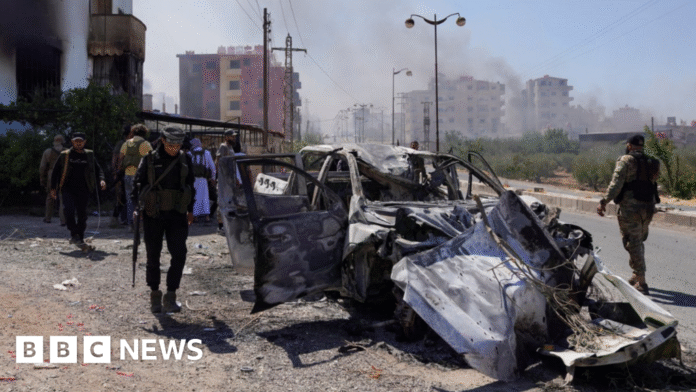Sectarian clashes have continued in southern Syria despite an “immediate ceasefire” announced by the country’s president.
Over the past week fighters from the minority Druze community have been battling armed Bedouins in Suweida Province, with both sides accused of atrocities.
Syria’s interim President Ahmed al-Sharaa deployed troops but the government forces were accused of joining in attacks on the Druze. More than 900 people are reported to have been killed in the violence.
Israel declared support for the Druze earlier this week and intervened, hitting government forces and the defence ministry in the capital Damascus.
Sharaa announced the ceasefire on Saturday as Syrian security forces were deployed to Suweida to end the clashes. The deal included a halt to Israeli military strikes and was approved by Israel as part of US-brokered pact, as long as the Druze citizens were protected.
Government troops have set up checkpoints to try to prevent more people joining the fighting. But gunfire was reported from inside the city of Suweida later on Saturday.
A correspondent for AFP news agency said they had seen armed men looting shops and setting fire to them.
Also on Saturday, Israel’s foreign minister cast doubt on the renewed pledge by the president to protect minorities and all Syrians.
Suweida’s Druze community follows a secretive, unique faith derived from Shia Islam, and distrusts the current government in Damascus. They are a minority in Syria, as well as in neighbouring Israel and Lebanon.
In a social media post, Gideon Saar said it was “very dangerous” to be part of a minority in Syria, and “this has been proven time and again over the past six months”.
Israel’s Prime Minister Benjamin Netanyahu has pledged to prevent harm to the Druze in Syria because of their ties to those living in Israel.
Watch: How a day of bombing unfolded in Damascus
Long-running tensions between Druze and Bedouin tribes in Suweida erupted into deadly sectarian clashes last Sunday Sunday, following the abduction of a Druze merchant on the highway to the capital, Damascus.
According to the UK-based Syrian Observatory of Human Rights (SOHR), 940 people have been killed since then.
The ceasefire between Israel and Syria on Friday was announced by US special envoy to Syria Tom Barrack on Friday.
“We call upon Druze, Bedouins, and Sunnis to put down their weapons and together with other minorities build a new and united Syrian identity in peace and prosperity with its neighbours,” he said.
The BBC’s Middle East correspondent Lina Sinjab, reporting from Syria, said violence towards the Druze has been spreading across the country.
Earlier this week, UN human rights chief Volker Türk said his office had received credible reports indicating widespread violations and abuses during clashes, including summary executions and arbitrary killings in Suweida.
Among the alleged perpetrators were members of the security forces and individuals affiliated with the interim government, as well as local Druze and Bedouin armed elements, Türk said in a statement.
“This bloodshed and the violence must stop,” he warned, adding that “those responsible must be held to account”.
In his comments on Saturday morning, the Syrian leader said that his government “is committed to protecting all minorities and sects in the country and is proceeding to hold all violators accountable from any party. No-one will escape accountability.”
Additional reporting by Jack Burgess



